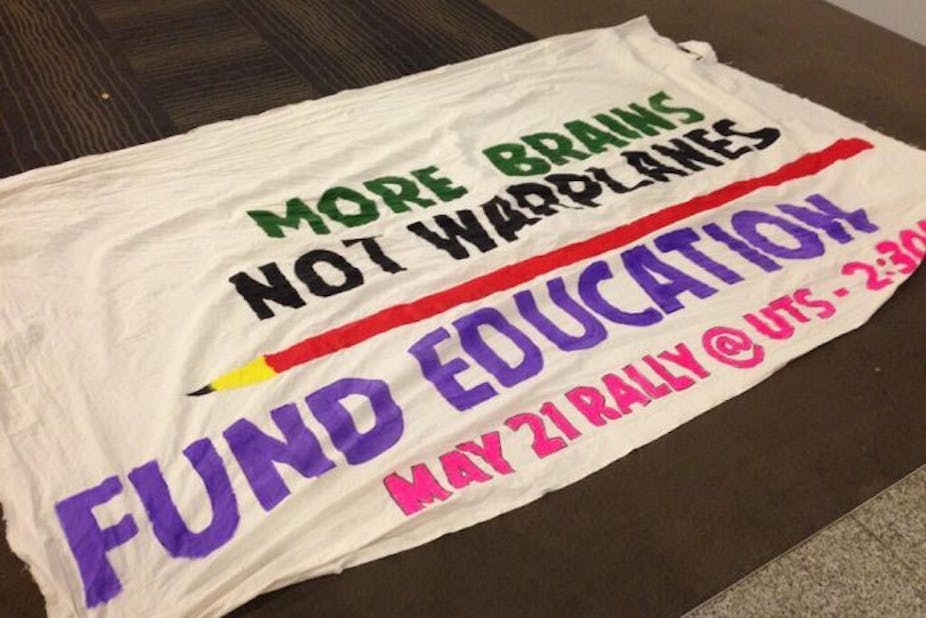Who said student demos were dead? A well organised group of protesters hijacked ABC TV’s Q&A for two minutes on Monday 5 May. They were protesting against Education Minister Christopher Pyne who appeared on the program to argue for deregulating higher education.
Quite what “deregulation” means is unclear. Pyne said recently he wanted to “set our universities free”, “to compete in a global education market” but beyond that insisted he would not pre-empt the budget.
Q&A host Tony Jones tried to quell the protesters by saying “OK guys, you’re doing yourself no favours”. But that is not true. The protesters attracted far more attention and possibly opposed budget cuts and fee increases more effectively than the normal crowd on the steps of Parliament House waving banners and listening to speeches over a dodgy public address system.
Once the protesters were ejected Jones welcomed viewers back to the program with apologies and “That is not what we want to happen on this program. That is not what democracy is all about and those students should understand that.” No one doubts that the ABC doesn’t want its programs disrupted, but there is more doubt over whether the protesters’ direct action “is not what democracy is all about”.
Political tension over financing higher education and many other social programs has been heightened by the Commission of Audit’s provocative report. The Commission’s analysis and recommendations have been widely criticised, including strongly in The Conversation.
However, while Prime Minister Abbott quickly ruled out the Commission’s most unrealistic proposals, he and the Education Minister have not indicated what if any of the recommendations on higher education are being entertained seriously.
For a report that proposes lots of “courageous” and robust government decision making, the Commission was unusually consultative on student fees, recommending:
Tasking the Minister for Education with developing options to increase competition in Australia’s education system through a partial or full deregulation of fees for bachelor degrees, taking into account any relevant recommendations of the Review of the Demand Driven Funding System. The Minister should report to the Prime Minister in 12 months’ time on progress and a preferred way forward.
Crucially, the government has not suggested that it may consult further on higher education beyond the review of the demand driven system and the Commission of Audit. Indeed, in his “set universities free” speech, which was delivered in London before a right wing think tank, Pyne suggested that the government did not need to consult further before announcing decisions in the budget:
I am considering the government’s response to Kemp-Norton in the context of the coming Federal Budget, alongside input from our National Commission of Audit. Both the Kemp-Norton review and the work of the Commission of Audit have provided extensive opportunity for consultation across and beyond the higher education sector. The Kemp-Norton report has stimulated valuable discussion of options for the future of higher education in Australia.
Students and the many others concerned for higher education may very well believe that direct action is the only option they have left to express their views effectively on possible budget announcements in less than a week. If the government’s “deregulation” does indeed extend to increasing student fees we may expect many more rowdy protests. The student demo is not dead.

